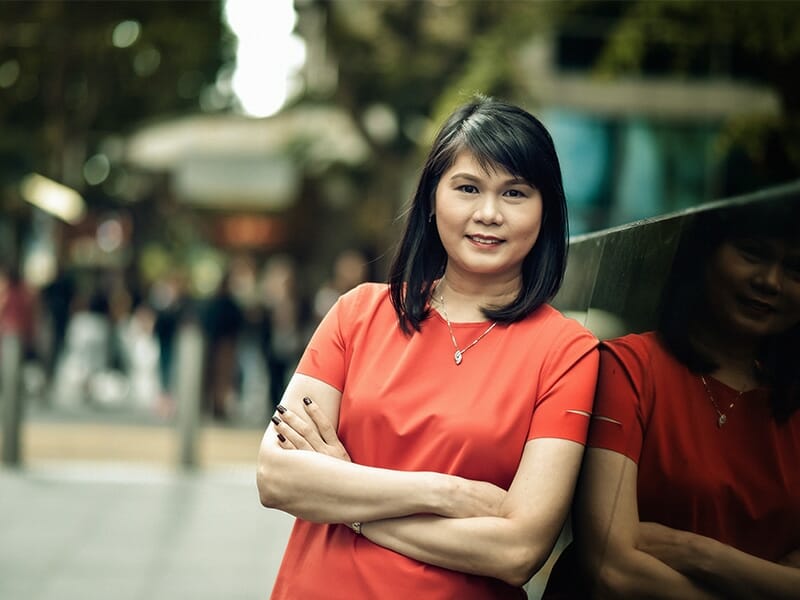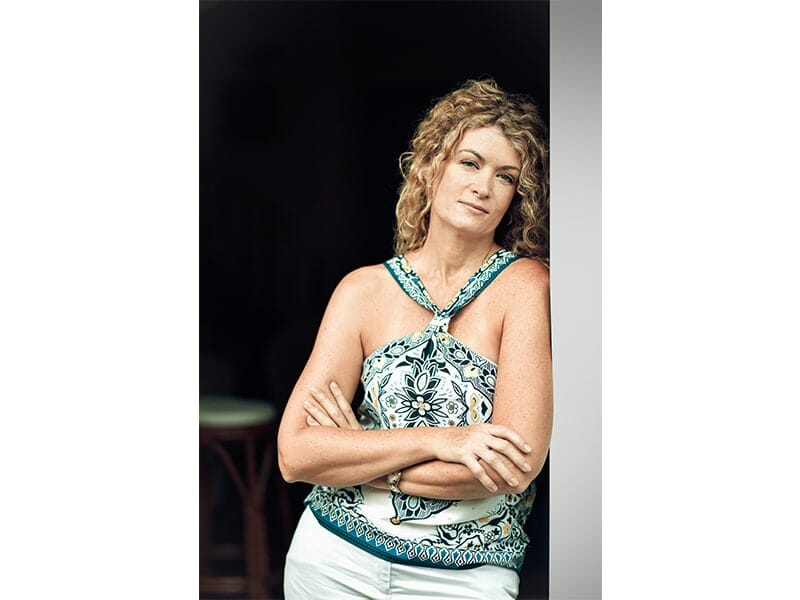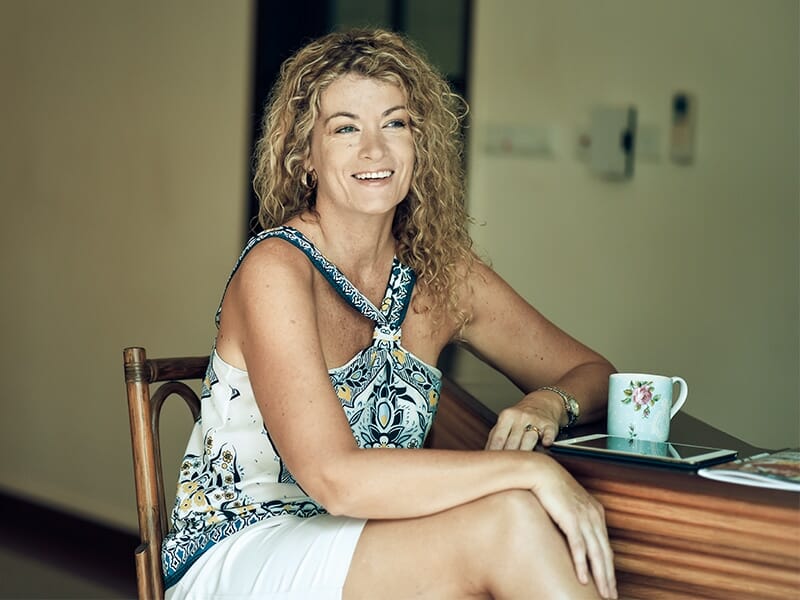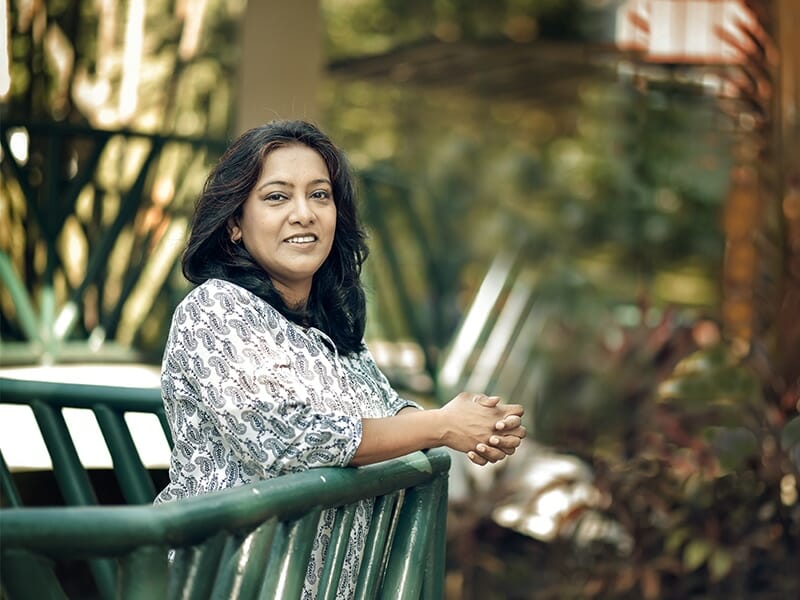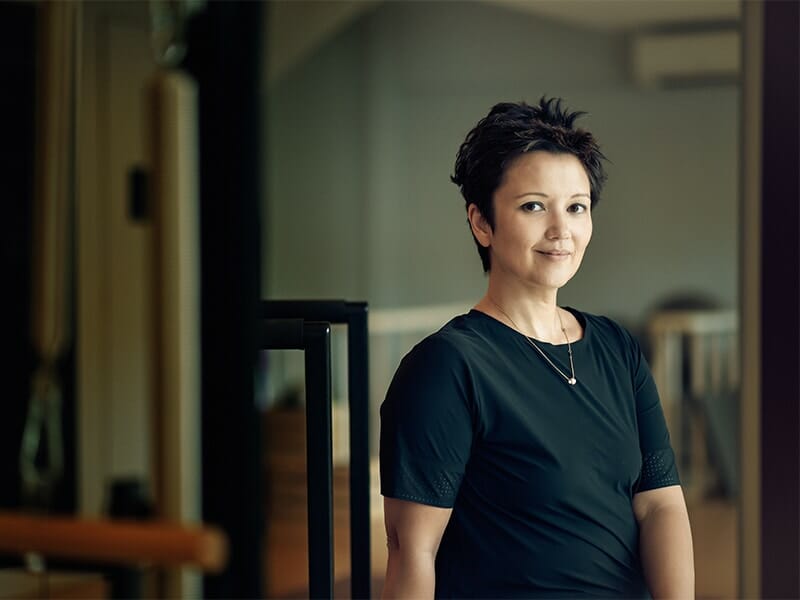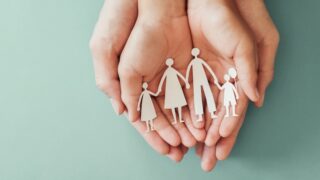It’s the most common cancer affecting women worldwide, and early detection is key in saving lives. That’s why, in the spirit of Breast Cancer Awareness month this October, we reached out to four readers who agreed to share their experiences and inspirational stories of survival.
Katherine Roselle 45, Filipino
“I discovered I had breast cancer while I was suffering from domestic abuse.”
Katherine’s diagnosis came at an extremely low point in her life. “When I discovered I had Stage One breast cancer, I was in a bad place. For 14 years I’d been in a marriage that was abusive – verbally, emotionally and physically,” she says. At the time, her three daughters were five, 12 and 14 years old. She had originally moved to Singapore from the Philippines so they could get a better education.
When she found out she had cancer, the first thing she thought about was her daughters and their wellbeing.
“I felt sad for my girls, as they were so young. The thought of leaving them without a mother was too much to bear,” she says. “To be honest, it felt like the last straw after all the emotional stress and heartache from marital betrayal that I’d been going through. At the time, I struggled along on my own and didn’t share my pain with anyone. What’s more, this was my second bout with cancer. I’d had ovarian cancer when I was 22, had one ovary removed and went through chemotherapy.”
Katherine was advised to have a right breast mastectomy and reconstructive surgery. “I came home with tubes still attached to me to drain the excess fluids. I was so determined to get on with things and act as normally as possibly that I even went to the cinema with my tubes and drainage bag hidden under a loose dress!”
Having already gone through chemotherapy once, Katherine weighed up her options and decided not to put herself through it again. “My left breast still had a few lumps that the surgeon deemed it unnecessary to take out,” she says. “At first, I went for regular check-ups and scans for this breast every six months. After the five-years scan, I was pleasantly surprised to discover that the lumps had significantly shrunk, and some had even disappeared. I didn’t know that was possible!”
Less than a year after her breast surgery, Katherine suffered another physical attack by her husband. “This time, something inside me snapped. I decided that was it, I didn’t want to continue living this way,” she says.
“I think cancer put everything into perspective for me – I wanted to be strong for my daughters, and no longer to be the victim in a toxic relationship.” So, she took the plunge and filed for divorce. At first, her husband didn’t agree to the separation and withheld financial support.
“I had to go through the courts and wait four years to be officially granted a divorce. And though it felt like another low point for me, I’m glad that I decided to stand up for myself and do what was right for my children.” Although a breast cancer diagnosis may seem like the end of the world, Katherine insists that it should not be seen that way. “Compared with 20 years ago, medical treatment now offers a much higher chance of recovery. Advances and new discoveries are coming out at a pace we’ve never seen before,” she says.
“Be sure that you have a good insurance plan for critical illness. It makes all the difference when it comes to covering costs, and it helped me tremendously throughout my treatment and recovery period.”
After coming out the other side, Katherine now believes there’s a silver lining to every cloud. “Diagnosed with a life-threatening illness, you quickly evaluate what’s important to you. I asked myself what type of legacy I wanted to leave, and how I wanted to define my life moving forward. For me, it meant ending my toxic relationship and putting myself and my daughters first. What’s more, my experience has helped to teach them resilience,” she says.
Kris Parkinson 46, Australian
“I was diagnosed while nine weeks pregnant.”
During her first routine appointment with an obstetrician-gynaecologist (ob-gyn) in Sydney, Kris had a routine breast examination that unexpectedly revealed a lump in her left breast. “At the time, I thought it was just a normal part of early pregnancy, and considering I’d had a full health check including a breast exam only five months earlier, I didn’t pay any attention to it,” she says.
Her doctor decided it would be safer to have it checked. At first, ultrasound testing came back as inconclusive, so she underwent a shielded mammogram, which again produced normal results. Her doctor, however, advised a further fine-needle biopsy. “I was still not particularly worried,” says Kris, “as I was sure it was just a normal part of my body changing.”
When her surgeon called to say that the biopsy had revealed a malignant, high-grade tumour, it was a huge shock. “My first thoughts were for my unborn baby. Then, I wondered how I would break the news to my husband,” she says.
“The tumour I was diagnosed with was a triple negative DCIS (ductal carcinoma in situ). I was very lucky that after having 25 lymph nodes removed from under my arm the cancer had been caught early and had not spread outside the breast, but because of the aggressive nature of triple-negative breast tumours I was advised to terminate my pregnancy and then undergo treatment.”
Although she tried to bargain with her doctors to continue with her pregnancy and then have a double mastectomy after the baby was born, they advised against it. There was a real risk that she might not survive that long, due to the tumour growing so quickly. Kris then had to make the heart-wrenching decision to terminate her first pregnancy and start treatment to save her life.
“I decided not to have the mastectomy, because I simply could not face losing both my baby and my breasts. I chose to have a wide excision lumpectomy followed by four rounds of chemotherapy, and then six-and-a-half weeks of radiotherapy,” she recalls.
Going through chemo, Kris had a lot of mixed feelings. “I knew I’d lose my hair, but wasn’t sure when. After the first treatment I felt tired and sick, and by the third my hair was gone and I had my wig. It cost a fortune, but it made me feel glamorous. My doctor and my oncologist worked closely together and formulated a treatment plan which included surgery, chemotherapy and radiotherapy together with naturopathic medicine, traditional Chinese medicine, meditation and diet. I felt well enough to continue going to work.”
Both she and her husband were determined to get over this bump in the road, she says. “We really concentrated on taking care of each other. That said, I’ve always considered myself a very strong person. This experience taught me the importance of facing things head on, because to do anything else is a waste of precious time. Most importantly, it also showed me that, despite my bravado, it was OK to fall apart and admit I was scared, and to allow myself to be completely vulnerable. Cancer has taught me humility; that it is OK to admit I can’t cope.”
Her advice? Don’t be afraid to ask questions. She also believes you have to make sure you feel comfortable and secure with your medical team, as they’ll be by your side on the road ahead. “Listen to your body, and if something doesn’t feel right, say so. You are your own best advocate. When you’re tired, make sure you rest. When you feel well enough, go out for walk or a run, or just sit outside and be present and thankful for each moment.”
Despite the trauma of the cancer and losing her baby, Kris has gone on to raise a beautiful family. “Hopefully, by talking about my experience I can help someone who is struggling with the same thing, and let them know that there can be a happy ending to this dark and lonely time,” she says. “I’m now 14 years clear and have had two beautiful children, and every time I look at them I realise how incredibly fortunate I am.”
Shobha D’Sa 46, Australian
“I was diagnosed with two types of cancer at the same time.”
The first thought that came rushing into my head was that I couldn’t imagine my daughter having to grow up without a mother,” says Shobha, who was diagnosed with early stage breast cancer in February 2017. “I blamed myself, and was filled with regret for letting my family down. I was convinced that if I had lived a healthier lifestyle, things would have been different.”
What’s more, about three weeks after her breast cancer was diagnosed in the course of her annual health check-up, she was also diagnosed with a gastric carcinoid – a neuroendocrine tumour – which needed to be removed before she underwent breast surgery.
“I was diagnosed with lobular breast cancer in my left breast. Through research, I learnt that it’s not easy to diagnose, and it typically manifests itself in both breasts.”
Diagnosed with multiple cancers, Shobha didn’t want to take any chances when it came to treatment. “My sole aim was to ensure I survived to see my daughter grow up and get married. I wanted to be able to hold my grandchild. I also didn’t want to spend the rest of my life worrying about breast cancer recurrence, so in the end I chose a double mastectomy with reconstruction.”
Shobha turned to close friends and her immediate family for support. “The initial few days were an absolute blur. I was unsure and afraid of what I was up against. My brother, who has a three-year-old daughter himself, dropped his family and work commitments and came all the way from Canada to be with me during my hospitalisation,” she recalls.
“It was so reassuring to open my eyes after surgery and see my husband and brother watching over me. My husband, who is not the world’s greatest communicator at the best of times, went into denial at first and acted as if my diagnosis was a mistake. It took him a long time to come to terms with it. I guess it was his way of handling things. He did become an absolute rock of support when I came home after surgery and needed help with basic daily routines like bathing and dressing myself.”
She also found a great source of support by connecting with other women who had been through similar experiences. “They were also mothers and working women just like me. Hearing about their cancer journey and how they managed gave me strength and the belief that I could do it too.”
Additionally, she went for professional counselling via her company’s Employee Assistance Programme (EAP). “This helped me to articulate my fears, especially when it came to how to tell my daughter. Before my surgery, my husband and I explained the situation to her. Later, I arranged with her homeroom teacher for her to meet with a school counsellor, who taught her some simple coping techniques that she found really helpful.”
Shobha’s advice to women going through this ordeal? To stay strong and, above all, to believe in yourself. “The entire process takes a lot out of you, both physically and emotionally. While it’s a difficult period, try not to stress about what the future holds. Take things one day at a time. Also, do something to pamper yourself frequently – you deserve it.”
Above all, says Shobha, her journey has empowered her to believe in her own strength. “I realised that I was actually much more resilient than I thought I was. The uncertainty I’ve felt throughout this experience has taught me to focus on things that I can control, rather than getting angry or upset over situations I can’t influence.”
Alisandra Khairuddin 45, Malaysian
“I lost my mum to breast cancer, so I knew I had to be extra-vigilant.”
Before her diagnosis, Alisandra was a busy wellness entrepreneur. “I had just set up my own company, and was looking for a studio where I could teach Pilates, fitness and nutrition coaching, specifically for women,” she says.
In February 2015, she received the results of the BRCA gene test she’d had done. “I had the test because I lost my mum to breast cancer in 1980 when I was seven years old, so I knew I had to be extra-vigilant. I had my first mammogram and ultrasound scans when I was 30.”
The test results showed two unknown gene types, which meant that the doctors didn’t have enough information at the time to assess her risk of cancer. “When that happened, I just accepted it and got on with my life.”
Just a few months later, following a routine mammogram, she was told she had breast cancer. “It felt like an out-of-body experience. I was shaking. My husband was with me, and all I could think about was dying, and what would happen to my daughters if I were gone. They were at the forefront of my mind.”
Alisandra spiralled into depression and didn’t know how to talk about her feelings. “One morning around 6am, I drove to Labrador Park and just sat on a bench and sobbed. Having grown up without my mum for most of my life, I just couldn’t stand the idea of my daughters having to go through the same thing. I thought of things I could do to prepare for the worst, like writing them a book to impart whatever wisdom or anecdotes I wanted to share with them, or writing them birthday cards for each year until they were 21.”
Eventually, she started a blog called Rocked by Pilates, which chronicled her journey. “For me, it was a form of therapy, where I felt freer to express my feelings.” Her husband and her sister in Malaysia gave her great support. “My other half was incredible, and we were honest with my daughters from day one so that they would understand everything.”
As the lump was small, her doctor had at first suggested a lumpectomy. However, it was not clear how far it had spread, so a mastectomy was advised.
“Given my family history, I argued for a bilateral mastectomy – a removal of all the breast tissue. I didn’t want to live in fear of a recurrence for the rest of my life. At the time, I was probably at the pinnacle of my fitness, too, so if I had to go through a huge operation, that was the time to do it. Although doctors prefer to preserve the breast tissue, he agreed it was justified in my case to have both done.”
The bilateral mastectomy with breast reconstruction required her to spend a week in hospital to recover. “Afterwards, I could barely lift my arms,” she recalls, “and tying my hair back was impossible. I did daily exercises to bring back the movement.”
A few weeks later, she discovered an infection in her right breast, caused by the reconstruction surgery. “It lasted for three months, and got so bad that they decided to remove the implant on the right-hand side.”
During this time, she’d been on a cocktail of antibiotics which had made her feel physically ill, constantly bloated and nauseous. “After my implant was removed, I was left with a weird-looking left breast and a sunken right chest,” she says.
To add insult to injury, in May this year, Alisandra discovered a mysterious rash on the left side of her abdomen; it was misdiagnosed as shingles. “Within 24 hours I was in excruciating pain. It turned out that I now had an infection in my left breast – unbelievable! So, back into surgery I went for the left implant expander to be removed. I’ve now had seven surgeries in total.”
Instead of feeling relieved when her treatment was finally over, she felt lost and uncertain, she says. “My doctor and her staff had been looking after me every week. Now the cancer treatment was over, I was unsure how I’d look after myself. I’m now on Tamoxifen for five, maybe ten years. It’s made me go into early menopause too, which isn’t great, but it’s what I have to do.”
According to Alisandra, this experience has taught her what truly mattered most for her in life – her family’s health and happiness. “A month before my diagnosis, I thought I was on top of the world. But I was easily stressed and angered, and would snap at my family, the three people who mattered most to me. I’ve learnt to enjoy the simple things and to slow life right down. Also, I’m a lot more calm and patient now than I was before.”
If you’re going through chemotherapy, she says, don’t feel bad that you can’t function normally. There’s no need for you to prove to the world that you’re superwoman. Allow yourself the time to heal. “By the way,” she adds, “if you lose all your eyebrow hair too, Tom Ford’s eyebrow pencils are a godsend!”
Several more surgeries lie ahead, including cancer checks, a scar excision and potentially more reconstruction surgery. “I’m not stressing over the reconstruction, as it’s purely aesthetic. Most of the time now I wear my prosthetic breasts, which have an awesome shape. When I’m working out, I don’t wear anything. I’m flat, and I’m proud,” she says.
With her cancer battle behind her, Alisandra is finally pursuing her career dreams. “I finally started my own Pilates, fitness and nutrition studio. It’s taken me quite a while to get my mobility and strength back to what they used to be, but I’ve learnt to accept that. Some of my clients are breast cancer patients, too. Once a week, I have a free class for survivors called Free for Pink. I want to be able to give back by helping others who have gone through or are going through something similar.”
Photography by Kym Bernabe

